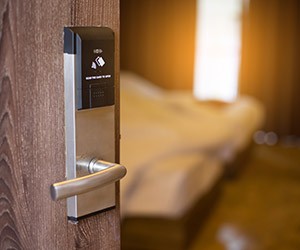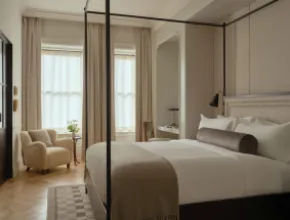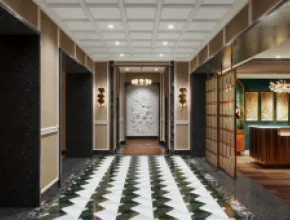Caesars Entertainment joined other major hotel companies that are modifying their room-check policies by instituting a new protocol that requires every occupied room to be checked at least once every 24 hours.
“Historically, there have been tags that have said ‘Do Not Disturb’; we are eliminating them and instead they will read ‘Room Occupied,’” said Rich Broome, executive vice president of communications and government relations for Caesars Entertainment. “Housekeeping staff will not enter the rooms [when there is a room occupied indication], but security will knock on the door once a day and say, ‘Can I do a visual inspection of the room?'"
Broome said that housekeepers will maintain a roster of rooms where the room occupied signs are displayed and present that is provided to security personnel, who at some point in the day would knock on the door and request to conduct a visual inspection of the room. If something is amiss, security staff will implement a protocol to alert supervisors and managers to determine how to best handle the specific situation.
Broome said that the casino giant will implement the policy in all of its properties worldwide shortly.
Several major hotel companies, including Disney, Hilton, Wynn Resorts and Boyd Gaming, have altered their "do not disturb" policies in the wake of the October 2017 mass shooting in Las Vegas.
A similar move by Walt Disney World Resort hotels in December 2017 resulted in a large degree of meetings industry discussion on whether such plans infringe on guests’ privacy or are even effective in preventing mass shootings and other security and safety issues.
Read more on the industry response to this issue in the follow-up Meetings Today article:
New 'Do Not Disturb' Hotel Policy Updates Spark Industry Debate.
Hilton Hotels and Resorts also recently updated its “Do Not Disturb” policy, according to hotel industry website LoyaltyLobby, and the company is encouraging hotel employees to report any “suspicious” behavior.
According to LoyaltyLobby, the new Hilton procedures list the following items as potentially “suspicious”:
- Guests overly concerned about privacy.
- Guests refusing room cleaning for extended period of time.
- Those taking photos and notes about the hotel.
- Switching rooms a number of times.
- Requesting specific rooms.
- Extended use of DND sign.
- Using cash for payment.
- Guest doesn’t leave the room for extended period.
- Guest leaves the room for extended period.
Among the new security policy details, Hilton guest directories will include the following verbiage:
“We understand and respect your need for privacy. The hotel reserves the right to visually inspect all guest rooms every 24 hours to ensure the well-being of our guests and confirm the condition of the room.”
Unable to service room cards will add this additional language: “If service is refused for this length of time, a member of hotel management will check on the guest room.”







